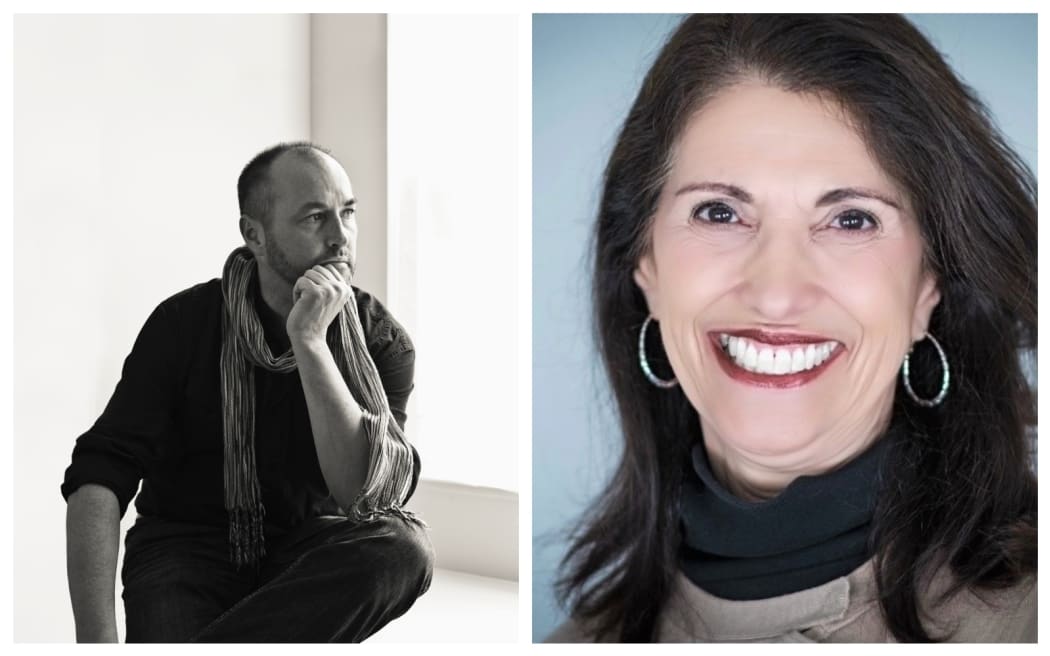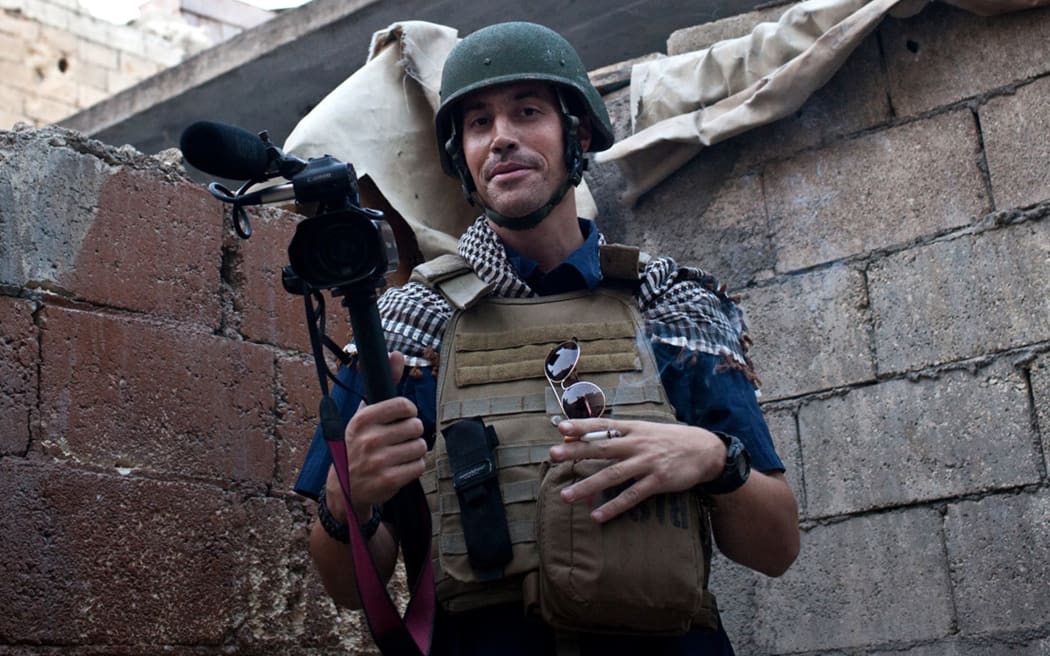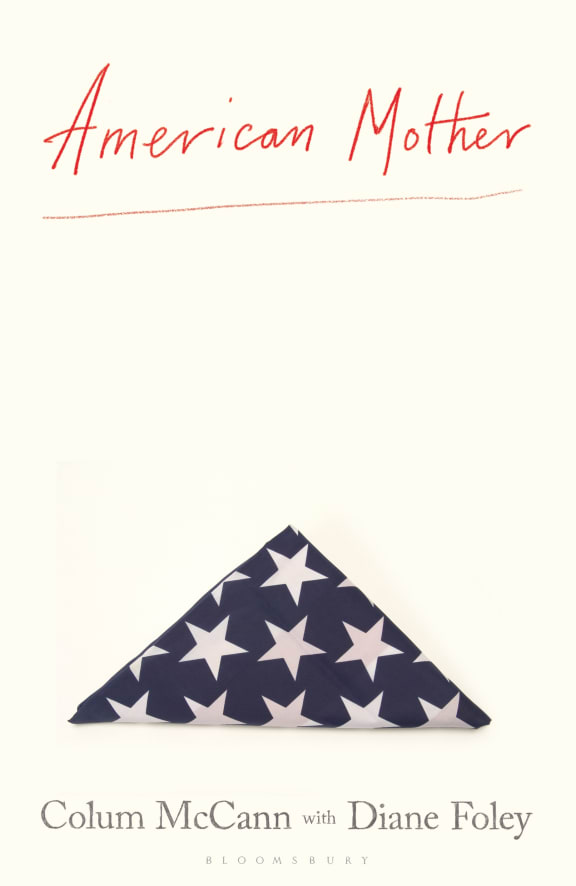
Author Colum McCann and Diane Foley, mother of murdered journalist, James Foley. Photo: Dustin Aksland / Jonathan Vogel
The loss of a child is unbearable. To lose them in a brutal public beheading, unimaginable.
But then to come face to face with their killer?
This encounter between mother and murderer forms the opening chapter of Colum McCann's latest book: American Mother.
In it, the legendary Irish author tells Diane Foley's story, detailing the months and years after her son's capture by Islamic State, and her desperate campaign to bring him home.
Speaking with RNZ's Saturday Morning, Diane recalled how she first became aware in late 2012 that her journalist son James, who had previously been taken captive for six weeks by Gaddafi's troops in Libya, had again been captured - this time in northern Syria.
"We did not hear from him on our Thanksgiving Day, which is a big holiday in the United States, end of November. And that was strange not to hear from him on that day because he always called on holidays and birthdays and such."
The next morning, she received a call from one of her son's colleagues with the news that James had been kidnapped, just a few miles from the Turkish border.
"We were shocked that it could happen again."
To make matters worse, she said, his captors could not immediately be identified, given the number of foreign fighters pouring into northern Syria at the time.
"The fixer had no idea who had taken Jim, and thus began nine long months of not knowing if Jim was alive or not."
Diane got through those days "one day at a time", she said, with a lot of prayer.
In a desperate attempt to try and get James home, she quit her job and "started going to Washington monthly", trying to speak with anyone who would speak with her "at the FBI, the State Department and once I got into the White House and met with ... National Security Advisor Susan Rice".

James Foley in Syria in 2012. Photo: AFP
She was, she said, "continually reassured that Jim was our country's highest priority - and then sent back in circles to talk to the same people and I never got any information from anybody".
The reason for that, she would later discover, was that the country had "no US hostage enterprise, no fusion cell, no one who is accountable for bringing innocent Americans home".
"I wish they'd just told me that, but instead they patiently listened and told me they were on it and that Jim was the highest priority. But in fact, they really didn't know what to do with me."
Other hostages with European citizenship who were being held alongside James were eventually released after their governments negotiated with the captors, but the first time Diane realised that would not be an option for her son was when an official informed her the US government would not be doing the same - and that she could be prosecuted if she attempted to raise a ransom herself.
It was "a very upsetting time", she said.
"I guess now that I look back on it, it was the first time I was very clearly told the truth, in that our country was not planning to do anything to get Jim out."
She said she blamed herself for her ignorance on the matter.
"We did not know Washington or politics or anything about international hostage taking. So we really didn't know how to get the attention we needed to bring Jim home, so we failed."
In August 2014, just three months after that threat of prosecution if she attempted to raise a ransom to secure her son's release, Diane received another phone call.
"It was a journalist who called me and out of the blue on a beautiful August day she called and she was sobbing. And I really couldn't quite understand her and all she could say was 'look at Twitter' and hung up.
"And so I looked at Twitter and that's when I saw the horrific image of Jim with his head resting on his back," she said.
"I had to look at the image just to make sure I knew it was Jim and it looked just like Jim, but I hoped that it was photoshopped and ... so I proceeded to anxiously email anyone I'd ever seen in the government, our FBI agents, anyone to confirm that Jim had been killed."
McCann, who said he remembered being "rooted to my seat with horror" when he saw imagery of James' brutal murder by his captors, said it was extraordinary that Diane had been able to turn her grief into "something incredibly positive".
"The oxygen went from the air when we all saw that image, which is probably the second-most iconic image after the [Twin] Towers coming down ... certainly for the first early part of the 21st century."
Two of the group of Islamic State terrorists believed to be responsible for James' execution were eventually brought to justice.
Having pled guilty to eight counts of human rights crimes, kidnapping, torture and the murder of four American citizens, one of them, Alexanda Kotey, offered to meet with Diane.
She said James had worked with young men who had had rough upbringings without the guidance they needed, like Alexanda.
"I felt fairly sure right away that Jim would have wanted me to meet Alexanda and to hear him out, and also as a mother, I wanted to tell him who Jim was."
The rest of her family, she said, thought the idea was rather foolish and wanted nothing to do with it, so she was grateful when McCann - who she had met about seven years after James' death - offered to join her.
"I was so grateful, because I knew I wanted to go, but I was very grateful to have a friendly friend with me. I really was."

Photo: Supplied
McCann described the meetings between Diane and Kotey, which took place over three days in a courthouse in Virginia, as "one of the most extraordinary human moments that I've ever witnessed".
"There's FBI there. There's prison guards there, there are prosecutors, defence. And then there's this man sitting at a table in prison uniform with shackles on his ankles with a book open in front of him and a cup of coffee there in front of him.
"And Diane walked over and sat no more than four feet from him. And I got to witness that.
"And all the world dissolved away in that particular moment, everything came down to the fact that these two people were talking to each other, and there was a lot to talk about."
For her part, Diane said she was grateful for the opportunity to meet her son's killer.
"I think it's very important that we try to understand one another, even if we're on different sides of an issue and dislike each other, that we need to learn to listen to one another," she said.
"But it was incredibly sad because we had lost our beloved son Jim, and [Kotey's] lost his freedom, his family and country, most likely for the rest of his life - a just punishment, mind you, for his horrific human rights crimes - but nevertheless a very sad result of the hatred of the British jihadists."
McCann said his hope with American Mother was to tell not only Diane's story, but to try to capture who her son James was too.
"He was really interested in the people behind - the more anonymous corners of the war," he said.
"That sort of community is an incredibly committed group of people, and this is a story about journalists and journalism. And we also know that nowadays we're under such attack in various parts of the world, whether it be Mexico, Colombia, Gaza, you know, as journalists, we have to stand up and we have to tell the story of the brave ones."

